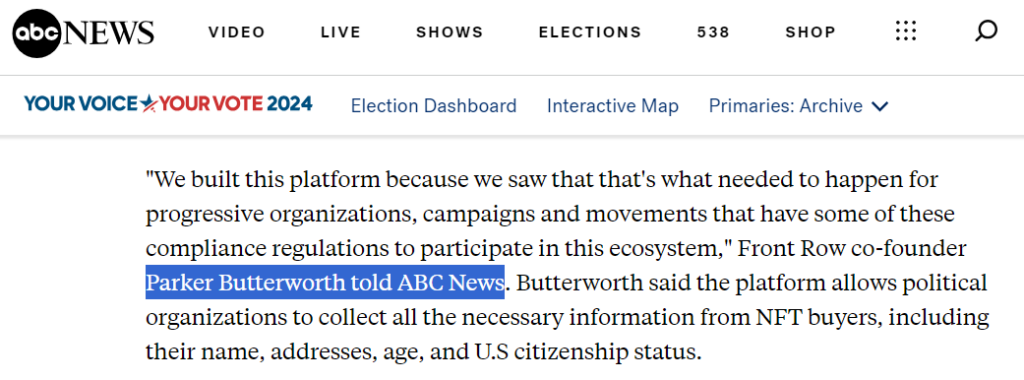It was not much long ago when the iconic “HOPE” poster of former U.S. president Barack Obama emerged during the presidential race in 2009 and literally catapulted his career to unprecedented heights.
This time, 15 years later, it is Non-Fungible Tokens (NFTs) that are redefining political campaigning in the U.S. even as both candidates Donald Trump and Kamala Harris race each other for the top post.
The first round of this NFT battle, hands down, belongs to 78-year-old Trump who has jumped on the gravy train and harnessed the power of NFTs for fundraising, community engagement and visibility.
Some might call political NFTs as ‘’cringe’’ or even “‘cartoonish” (going by this New York Times article) but what’s undeniable is that Trump has broken the taboo around NFTs and politics.
Trump and his NFTs
Just a year after he was ousted from the White House, Trump launched his initial collection of “Trump Digital Trading Cards” in December 2022.
The launch gathered extraordinary success and gained over $4.45 million from sale of 45,000 NFTs. But as is the case with other blockchain based assets, NFT prices are also volatile and his second collection of NFTs released in April 2023 faced a significant downturn, collecting only $1.5 million.
These fluctuations in sales have been closely tied to political events, such as a 90% drop following Trump’s arrest in June 2023. On the contrary, positive news, like his return to major social media platforms, led to a 503% increase in NFT sales.
Despite this, Trump’s total NFT sales volume has surpassed $30 million, reflecting a growing acceptance of NFTs in political campaigns.
Trump sees NFTs role beyond mere revenue
Trump’s engagement with NFTs extends above sales, like offering symbolic value and exclusivity including an opportunity for direct interaction with himself. This strategy illustrates how NFTs can be used to build a loyal supporter base and enhance political engagement to his political journey. The Trump Digital Trading Cards have had significant trading activity, with over 15,808 ETH in trading volume since their launch.
Trump’s NFTs are more than just collectibles; they serve as symbols of political support. Initial collections offered perks such as Zoom calls and dinners with Trump, but their broader utility lies in their role as political strengths.
Melania also joins the NFT bandwagon
Former First Lady Melania Trump ventured into the NFT space with her own collection, released in December 2022. Her NFTs featured an audio “message of hope” that focused on children’s issues and Cyberbullying.
Her collection not only provided financial support for her cause but also contributed to the broader Trump NFT ecosystem.
Melania has also contributed to the NFT ecosystem, earning $330,609 from her own NFT sales. These figures indicate the substantial financial impact of NFTs on Trump’s campaign and personal wealth. While some question whether he is genuinely supporting the crypto community or primarily benefiting from these digital assets, his NFT ventures undeniably illustrate the financial potential and influence of digital assets in modern politics.
Republicans take the lead in NFTs
Republican candidate Dr. Scott Jensen has turned to NFTs for campaign fundraising. The sale of NFTs has not only provided a new revenue stream for him but also expanded Jensen’s supporter base by 2,500 individuals. This aligns with a broader trend of using NFTs to foster community engagement.
Blake Masters, a Republican U.S. Senate candidate in Arizona, has leveraged NFTs to boost his campaign. He says, “I was thinking of creative ways to raise money and I thought of NFTs because [they] can give people a sense of ownership,” who is also the co-author of “Zero to One,” a bestselling business book published in 2014. So Masters sold his supporters limited edition NFTs depicting the cover of his book — and raised nearly $575,000.
“[NFTs] are probably a better way than just to accept donations, because they are more of a symbolic representation of your beliefs,” said Argiro.
Democrats not far behind
Brian Forde, co-founder of the online fundraising platform Numero, is a key figure behind the integration of NFTs in political campaigns. He launched electables.com, a platform to use NFTs for Democratic campaigns, which currently has over 300 campaigns on its waitlist. Forde revealed that grassroots donors are seeking new ways to connect and be recognized, which NFTs facilitate by building a community among supporters.
Parker Butterworth said the platform allows political organisations to collect all the necessary information from NFT buyers, including their name, addresses, age, and U.S citizenship status.

Conclusion
The rise of NFTs in political campaigns signifies a shift in fundraising and engagement strategies. However, this new approach comes with challenges, including transparency concerns and regulatory uncertainties. The Federal Election Commission (FEC) has yet to provide specific guidance on NFT-related contributions.
Also Read: Exclusive: Why 50 million Crypto Voters matter in US elections?






